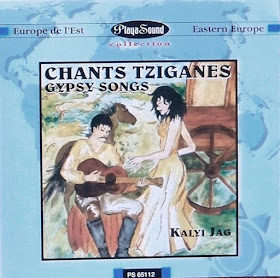 Until his death, Vladimir Vysotsky was a prophet without honor in his own country; although he wrote more than a thousand highly popular songs, he died without an official record release to his name. The reason for this studied neglect lay in the political tenor of his material. Vysotsky, who began performing in the 1960s, was quite critical of the Communist regime, and his lyrics took position on the Soviet status quo. His songs derived from the blatny pesny (literally, delinquent song) tradition, with its celebration of sex, drink, and street fights. Informally distributed cassettes ensured Vysotsky a wide and enthusiastic following. After his death, in 1980, Gorbachev granted his music an imprimatur and a 20-album retrospective was released.
Until his death, Vladimir Vysotsky was a prophet without honor in his own country; although he wrote more than a thousand highly popular songs, he died without an official record release to his name. The reason for this studied neglect lay in the political tenor of his material. Vysotsky, who began performing in the 1960s, was quite critical of the Communist regime, and his lyrics took position on the Soviet status quo. His songs derived from the blatny pesny (literally, delinquent song) tradition, with its celebration of sex, drink, and street fights. Informally distributed cassettes ensured Vysotsky a wide and enthusiastic following. After his death, in 1980, Gorbachev granted his music an imprimatur and a 20-album retrospective was released.
Vladimir Semyonovich Vysotsky (January 25, 1938 – July 25, 1980) was an iconic Russian singer, songwriter, poet, and actor whose career has had an immense and enduring effect on Russian culture. Though his work was largely ignored by the official Soviet cultural establishment, he achieved remarkable fame during his lifetime, and to this day exerts significant influence on many of Russia's popular musicians and actors who wish to emulate his iconic status.
His songs – over 600 of them – were written about almost any imaginable theme. The earliest were Outlaw songs. These songs were based either on the life of the common people in Moscow (criminal life, prostitution, and extreme drinking) or on life in the Gulags. Vysotsky slowly grew out of this phase and started singing more serious, though often satirical, songs. Many of these songs were about war. These war songs were not written to glorify war, but rather to expose the listener to the emotions of those in extreme, life threatening situations.
Nearly all of Vysotsky's songs are in the first person, although he is almost never the narrator. When singing his criminal songs, he would adopt the accent and intonation of a Moscow thief, and when singing war songs, he would sing from the point of view of a soldier. This created some confusion about Vysotsky's background, especially during the early years when information could not be passed around very easily. Using his acting talent, the poet performed his role play so well that until told otherwise, many of his fans believed that he was, indeed, a criminal or war veteran. Vysotsky's father said that "War participants thought the author of the songs to be one of them, as if he had participated in the war together with them." The same could be said about mountain climbers; on multiple occasions, Vysotsky was sent pictures of mountain climbers' graves with quotes from his lyrics etched on the tombstones.
Not being officially recognized as a poet and singer, Vysotsky performed wherever and whenever he could - in the theater (where he worked), at universities, in private apartments, village clubs, and in the open air. It was not unusual for him to give several concerts in one day. He used to sleep little, using the night hours to write. In his final years, he managed to perform outside the USSR and held concerts in Paris, Toronto, and New York City.
With few exceptions, he wasn't allowed to publish his recordings with "Melodiya", which held a monopoly on the Soviet music industry. His songs were passed on through amateur, fairly low quality recordings on vinyl discs and magnetic tape, resulting in his immense popularity. Cosmonauts even took his music on cassette into orbit. – His writings were all published posthumously except for one poem printed in 1975.
Every year on Vysotsky's birthday, festivals are held throughout Russia and in many communities throughout the world, especially in Europe. Vysotsky's impact in Russia is often compared to that of Bob Dylan in America.
From the linernotes:
"The present record contains the last performances by Vladimir Visotsky during his visit to Sofia. The spontaneity, the binding text between the songs and the whole atmosphere of the recording give us the chance to experience the pleasure of the direct contact with the poet, the actor, the musician and the person Vladimir Visotsky."
The album was published in 1981 on the Balkanton label.
Tracklist
1. Song about the pilot 05:05
2. Yellow lights rush into my dream 05:04
3. About the battle in the air 03:07
4. The visit of the muse or song about the plagiarist 02:31
5. Wild boar hunt 02:43
6. Incident on the road 02:57
7. At the start – the four leaders or who is running for what ? 04:51
8. What a thing, what a thing ! 02:35
9. Dialogue in front of the television set 04:11
(320 kbps, cover art included)
 Paul Daley (a former member of A Man Called Adam and the Brand New Heavies) and programmer Neil Barnes combined the classic soul of early Chicago and New York house with the growing Artificial Intelligence school of album-oriented techno to create classic, intelligent dance music.
Paul Daley (a former member of A Man Called Adam and the Brand New Heavies) and programmer Neil Barnes combined the classic soul of early Chicago and New York house with the growing Artificial Intelligence school of album-oriented techno to create classic, intelligent dance music.















